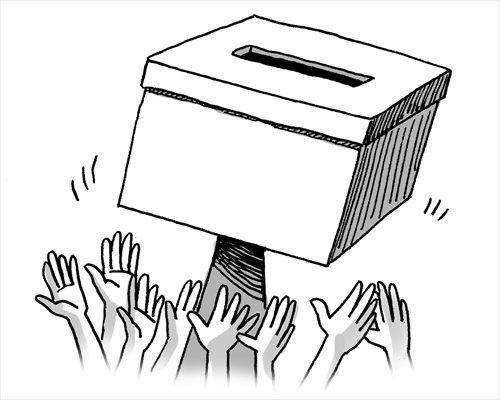Tangled rules complicate Myanmar election

Illustration: Liu Rui/GT
The Myanmar general election is set to take place at the end of October or the beginning of November. The upcoming election marks a turning point in the democratization process. Although more than 70 parties have registered, it will be chiefly a competition between the Union Solidarity and Development Party (USDP) and the National League for Democracy (NLD).
Voters will judge the ruling USDP's reforms over the past five years while Aung San Suu Kyi and the NLD under her leadership see it as the best opportunity to challenge the USDP. Other parties also seek the dividends of democratization.
The USDP has garnered support from the incumbent government and the military forces, but it is encumbered by its connections to the former military junta and has low public recognition and bitter internal divergences. President U Thein Sein is tussling with Thura U Shwe Mann, speaker of the Burmese House of Representatives, to be seen as the core driver of Myanmar's democratic reforms. There are also conflicts between the USDP, the government and the parliament, and the USDP has little influence on major decision-making. Meanwhile, the Thein Sein government is attempting to distance itself from the USDP, which has lost funding from the government. Generally the USDP is very unlikely to maintain its parliamentary majority in the election given the public's desires for change.
The NLD also has its internal problems despite its unparalleled clout in Myanmar political arena. Some senior members accuse Suu Kyi of nepotism and there is also a scramble for power between senior and young members. Besides, some members are unhappy with the NLD receiving funding from celebrities and Muslims.
Nonetheless, the NLD still holds a high chance of becoming the largest party in the parliament. But even if it wins the election, whether the NLD is able to govern the country well given its desperate lack of administrative experience remains in question.
Besides, Suu Kyi faces an institutional barrier since the constitution bans the spouses and immediate relatives of president and vice president from holding foreign nationality. Suu Kyi married an Englishman. In order to compete for the presidency, she has tried to prompt the international community to pressure the government and the NLD has mobilized public opinion for a constitutional amendment, supported by the majority of the public.
Recently Thein Sein and Shwe Mann agreed to the constitutional changes, but it remains uncertain whether the needed 75 percent support can be gained in parliament. The amendment is unlikely to be made before the upcoming election.
Apart from the USDP, the National Unity Party and the National Democratic Force, the other parties in the parliament are local ones that lack prominent leaders and smooth-running institutions. They focus on local development and their groups' interests but hardly consider the nation's general and long-term development, which makes it hard for them to have national influence. Besides, there is little contact or cooperation between them. It is foreseeable that these parties may lose some parliamentary seats and only keep their presence as a minority in the state-level parliaments.
Myanmar has a simple first-past-the-post system. The general election in 2010 and the 2012 by-election show a sharp gap between the number of seats that parties won and the number of votes they garnered nationwide. The USDP won over 30 percent of votes in the by-election but only got one seat due to a spread-out vote. Most parties demand a change to the election laws and the parliament has started the process, but it is firmly opposed by the NLD. Whether and how the electoral laws will be revised also has a large bearing on the election results.
Myanmar's democratic politics is unlikely to run as smoothly as in developed countries anytime soon. Myanmar's political transformation and democratization since 2010 has worked out a political reconciliation between the military forces and Suu Kyi-led democratic forces, but the country still faces more complex and deep-rooted ethnic issues. It will take much time for parties representing the minority interests and the USDP and NLD to reconcile with each other. The ethnic armed forces and parties will play an important role in Myanmar's democratization process.
The author is a professor at the School of International Studies at Yunnan University. opinion@globaltimes.com.cn